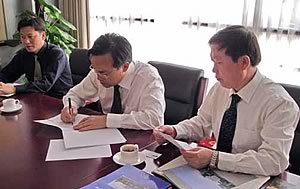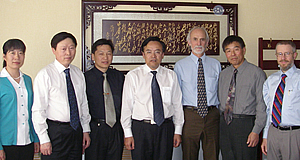China University, UAF sign dual-degree agreement
China University, UAF sign dual-degree agreement
Submitted by Marmian Grimes
Phone: (907) 474-7902
08/30/06

Download photo

Download photo
The University of Alaska Fairbanks signed an agreement this summer that will allow students from China University of Petroleum, Beijing to complete their undergraduate degrees at UAF.
UAF Provost Paul Reichardt, along with International Programs Director John Lehman and Tao Zhu, associate professor of petroleum engineering, visited the university in China this spring to sign the agreement.
The new agreement is actually a supplement to a preliminary agreement between UAF and CUPB first signed in 2003, according to Reichardt. When fully implemented, it will allow UAF to accept up to 25 undergraduate exchange students from CUPB each year. Students will complete their first two years of college in China and then finish their degrees at UAF.
"America and China are two great nations,"? said Zhu, an alumnus of CUPB. "We need to have good relations in the future especially for the next generation."?
In a broad sense, the agreement helps strengthen ties between Alaska and an up-and-coming economic world power, Reichardt said. "What better way to do that than through young people’s experiences in higher education?"?
For Chinese students, the benefits of participating in the exchange are multiple, Reichardt said. A degree from a U.S. university is held in high esteem in China, he said. In addition, two to three years of study in the United States provides valuable experience in how to interact with another culture.
"They clearly see one of their challenges as an emerging economy to become just generally more familiar with the rest of the world,"? Reichardt said.
The Chinese students will be able to enhance their English-speaking skills and establish contacts with professionals in their field in both Alaska and the rest of the United States, Lehman said, adding that the relationship will benefit the university community as well. "Our students and our faculty "| will get to develop the personal contacts with people who are likely to be the decision makers in China."?
The agreement also may open the door for UAF students to participate in short or extended exchanges with CUPB and stands to enrich cultural and intellectual diversity at UAF, Reichardt said. "I think part of our obligation is to kind of bring the world to our students who can’t or don’t experience it themselves."?
As part of the agreement, UAF will provide language and cultural orientation to students. UAF has also worked closely with the Chinese university to align the two institutions’ curricula. Lehman said the university will continue to refine both the student services and the curricular aspects of the exchange and expects to have both fully in place when the program reaches full capacity in two or three years.
The dual-degree program is the only of its kind at UAF, Lehman said, though similar programs are common at Lower 48 universities. What makes it different from a traditional exchange program is that students are actually enrolled at UAF and pay UAF tuition, rather that simply spending a semester or year at UAF while remaining enrolled at their home university and paying tuition there. He said UAF hopes to create additional dual-degree programs in the future.
Chinese students have already shown enthusiasm for the program, Zhu said. He interviewed about 20 students during the springtime trip and found eight who would be eligible for the exchange.
CONTACT: Marmian Grimes, UAF public information officer, at (907) 474-7902 or via e-mail at marmian.grimes@uaf.edu. Provost Paul Reichardt at ( 907) 474-7096 or via e-mail at fnpbr@uaf.edu. John Lehman, International Programs director, at (907) 474-5327 or via e-mail at john.lehman@uaf.edu. Tao Zhu, associate professor of petroleum engineering, at (907) 474-5141 or via e-mail at fftz@uaf.edu.


